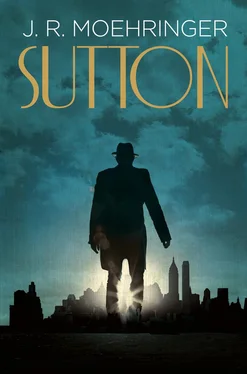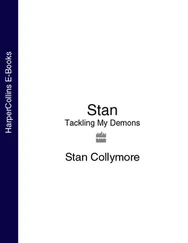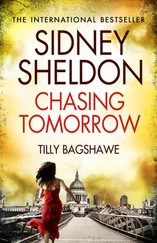And fuck the moon.
They blow on their hands, pull up their collars, make bets about whether or not the warden will ever be publicly exposed as a cross-dresser. Also, they bet on which will happen first—Sutton walks or Sutton croaks. The reporter from the New York Post says he hears Sutton’s not just knocking at death’s door, he’s ringing the bell, wiping his feet on the welcome mat. The reporter from Newsday says the artery in Sutton’s leg is clogged beyond repair—a doctor who plays racquetball with the reporter’s brother-in-law told him so. The reporter from Look says he heard from a cop friend in the Bronx that Sutton still has loot stashed all over the city. Prison officials are going to free Sutton and then the cops are going to follow him to the money.
That’s one way to solve the budget crisis, says the reporter from the Albany Times Union.
The reporters share what they know about Sutton, pass around facts and stories like cold provisions that will have to get them through the night. What they haven’t read, or seen on TV, they’ve heard from their parents and grandparents and great-grandparents. Sutton is the first multigeneration bank robber in history, the first ever to build a lengthy career—it spans four decades. In his heyday Sutton was the face of American crime, one of a handful of men to make the leap from public enemy to folk hero. Smarter than Machine Gun Kelly, saner than Pretty Boy Floyd, more likable than Legs Diamond, more peaceable than Dutch Schultz, more romantic than Bonnie and Clyde, Sutton saw bank robbery as high art and went about it with an artist’s single-minded zeal. He believed in study, planning, hard work. And yet he was also creative, an innovator, and like the greatest artists he proved to be a tenacious survivor. He escaped three maximum-security prisons, eluded cops and FBI agents for years. He was Henry Ford by way of John Dillinger—with dashes of Houdini and Picasso and Rasputin. The reporters know all about Sutton’s stylish clothes, his impish smile, his love of good books, the glint of devilment in his bright blue eyes, so blue that the FBI once described them in bulletins as azure . It’s the rare bank robber who moves the FBI to such lyricism.
What the reporters don’t know, what they and most Americans have always wanted to know, is whether or not Sutton, who was celebrated for being nonviolent, had anything to do with the brutal gangland murder of Arnold Schuster. A fresh-faced twenty-four-year-old from Brooklyn, a baseball-loving veteran of the Coast Guard, Schuster caught the wrong subway one afternoon and found himself face-to-face with Sutton, the most wanted man in America at the time. Three weeks later Schuster was dead, and his unsolved murder might be the most tantalizing cold case in New York City history. It’s definitely the most tantalizing part of the Sutton legend.
THE GUARDS MARCH SUTTON BACK TO ADMIN. A CLERK CUTS HIM TWO checks. One for $146, salary for seventeen years at various prison jobs, minus taxes. Another for $40, the cost of a bus ticket to Manhattan. Every released prisoner gets bus fare to Manhattan. Sutton takes the checks—this is really happening. His heart begins to throb. His leg too. They’re throbbing at each other, like the male and female leads in an Italian opera.
The guards march him back to his cell. You got fifteen minutes, they tell him, handing him a shopping bag.
He stands in the middle of the cell, his eight-by-six home for the last seventeen years. Is it possible that he won’t sleep here tonight? That he’ll sleep in a soft bed with clean sheets and a real pillow and no demented souls above and below him howling and cursing and pleading with impotence and fury? The sound of men in cages—nothing can compare. He sets the shopping bag on the desk and carefully packs the manuscript of his novel. Then the spiral notebooks from his creative writing classes. Then his copies of Dante, Shakespeare, Plato. Then Kerouac. Prison is where you promise yourself the right to live . A line that saved Sutton on many long nights. Then the dictionary of quotations, which contains the most famous line ever spoken by America’s most famous bank robber, Willie Sutton, a.k.a. Slick Willie, a.k.a. Willie the Actor.
Carefully, tenderly, he packs the Ezra Pound. Now you will come out of a confusion of people. And the Tennyson. Come into the garden, Maud, I am here at the gate alone . He says the lines under his breath. His eyes mist. They always do. Finally he packs the yellow legal pad, the one on which he was writing when the guards came for him. Not his novel, which he recently finished, but a suicide note, the one he began composing an hour after the parole board’s rejection. So often, he thinks, that’s how it happens. Death stands at your door, hitches up its pants, points its baton at you—then hands you a pardon.
Once Sutton’s cell is packed, the dep lets him make a few phone calls. First he dials his lawyer, Katherine. She’s incoherent with joy.
We did it, Willie. We did it!
How did we do it, Katherine?
They got tired of fighting us. It’s Christmas, Willie, and they were just tired. It was easier to give up.
I know how they felt, Katherine.
And the newspapers certainly helped, Willie. The newspapers were on your side.
Which is why Katherine’s cut a deal with one of the biggest newspapers. She mentions which one, but Sutton’s mind is racing, the name doesn’t register. The newspaper is going to whisk Sutton aboard its private plane to Manhattan, put him up at a hotel, and in exchange he’ll give them his exclusive story.
Unfortunately, Katherine adds, that means you’ll have to spend Christmas Day with a reporter instead of family. Is that okay?
Sutton thinks of his family. He hasn’t spoken to them in years. He thinks of reporters—he hasn’t spoken to them ever . He doesn’t like reporters. Still, this is no time to make waves.
That’ll be fine, Katherine.
Now, do you know anyone who can pick you up outside the prison and drive you to the airport?
I’ll find someone.
He hangs up, dials Donald, who answers on the tenth ring.
Donald? It’s Willie.
Who’s this?
Willie. What are you doing?
Oh. Hey. Drinking a beer, getting ready to watch The Flying Nun .
Listen. It seems they’re letting me out tonight.
They’re letting you out, or you’re letting yourself out?
It’s legit, Donald. They’re opening the door.
Hell freezing over?
I don’t know. But the devil’s definitely wearing a sweater. Can you pick me up at the front gate?
Near the Sleeping Beauty thing?
Yeah.
Of course.
Sutton asks Donald if he can bring him a few items.
Anything, Donald says. Name it.
A TV VAN FROM BUFFALO ROARS UP TO THE GATE. A TV REPORTER JUMPS out, fusses with his microphone. He’s wearing a two-hundred-dollar suit, a camel-hair topcoat, gray leather gloves, silver cuff links. The print reporters elbow each other. Cuff links—have you ever?
The TV reporter strolls up to the print reporters and wishes everyone a Merry Christmas. Same to you, they mumble. Then silence.
Silent Night, the TV reporter says.
No one laughs.
The reporter from Newsweek asks the TV reporter if he read Pete Hamill in this morning’s Post . Hamill’s eloquent apologia for Sutton, his plea for Sutton’s release, addressed as a letter to the governor, might be the reason they’re all here. Hamill urged Rockefeller to be fair. If Willie Sutton had been a GE board member or a former water commissioner, instead of the son of an Irish blacksmith, he would be on the street now .
Читать дальше












